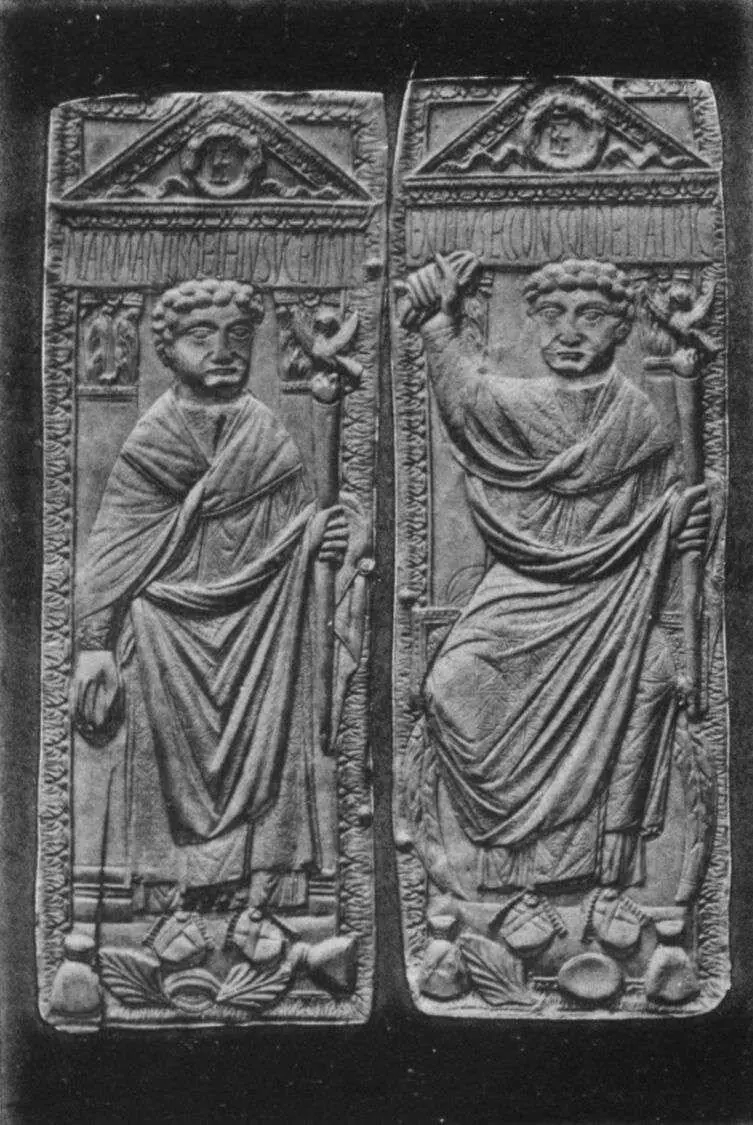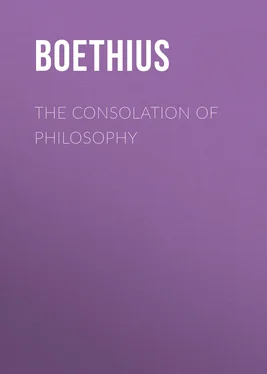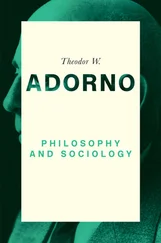Anicius Manlius Severinus Boethius - The Consolation of Philosophy
Здесь есть возможность читать онлайн «Anicius Manlius Severinus Boethius - The Consolation of Philosophy» — ознакомительный отрывок электронной книги совершенно бесплатно, а после прочтения отрывка купить полную версию. В некоторых случаях можно слушать аудио, скачать через торрент в формате fb2 и присутствует краткое содержание. Жанр: foreign_antique, Философия, foreign_edu, на английском языке. Описание произведения, (предисловие) а так же отзывы посетителей доступны на портале библиотеки ЛибКат.
- Название:The Consolation of Philosophy
- Автор:
- Жанр:
- Год:неизвестен
- ISBN:нет данных
- Рейтинг книги:4 / 5. Голосов: 1
-
Избранное:Добавить в избранное
- Отзывы:
-
Ваша оценка:
- 80
- 1
- 2
- 3
- 4
- 5
The Consolation of Philosophy: краткое содержание, описание и аннотация
Предлагаем к чтению аннотацию, описание, краткое содержание или предисловие (зависит от того, что написал сам автор книги «The Consolation of Philosophy»). Если вы не нашли необходимую информацию о книге — напишите в комментариях, мы постараемся отыскать её.
The Consolation of Philosophy — читать онлайн ознакомительный отрывок
Ниже представлен текст книги, разбитый по страницам. Система сохранения места последней прочитанной страницы, позволяет с удобством читать онлайн бесплатно книгу «The Consolation of Philosophy», без необходимости каждый раз заново искать на чём Вы остановились. Поставьте закладку, и сможете в любой момент перейти на страницу, на которой закончили чтение.
Интервал:
Закладка:
Boethius
The Consolation of Philosophy
ὄμως δὲ και ἐν τούτοις διαλάμπει τὸ καλὸν,
ἐπειδὰν φέρῃ τις εὐκόλως πολλὰς καὶ μεγάλας
ἀτυχίας, μη δι᾿ ἀναλγησίαν, ἀλλὰ γεννάδας
ὤν καὶ μεγαλόψυχος.
[Greek: homôs de kai en toutois dialampei to kalon,
epeidan pherê tis eukolôs pollas kai megalas
atychias, mê di analgêsian, alla gennadas
ôn kai megalopsychos.]
Aristotle's 'Ethics,' I., xi. 12.
Diptych representing Narius Manlius Boethius, father of Anicius Manlius Severinus Boethius. The inscription in full would run thus:—
NARivs MANLivs BOETHIVS Vir Clarissimvs ET INLvstris
EXPraefectvs Praetorio Praefectvs VrbiS Et
Comes Consvl ORDinarivs ET PARTICivs
( For description vid. Preface, p. vi The book called 'The Consolation of Philosophy' was throughout the Middle Ages, and down to the beginnings of the modern epoch in the sixteenth century, the scholar's familiar companion. Few books have exercised a wider influence in their time. It has been translated into every European tongue, and into English nearly a dozen times, from King Alfred's paraphrase to the translations of Lord Preston, Causton, Ridpath, and Duncan, in the eighteenth century. The belief that what once pleased so widely must still have some charm is my excuse for attempting the present translation. The great work of Boethius, with its alternate prose and verse, skilfully fitted together like dialogue and chorus in a Greek play, is unique in literature, and has a pathetic interest from the time and circumstances of its composition. It ought not to be forgotten. Those who can go to the original will find their reward. There may be room also for a new translation in English after an interval of close on a hundred years. Some of the editions contain a reproduction of a bust purporting to represent Boethius. Lord Preston's translation, for example, has such a portrait, which it refers to an original in marble at Rome. This I have been unable to trace, and suspect that it is apocryphal. The Hope Collection at Oxford contains a completely different portrait in a print, which gives no authority. I have ventured to use as a frontispiece a reproduction from a plaster-cast in the Ashmolean Museum, taken from an ivory diptych preserved in the Bibliotheca Quiriniana at Brescia, which represents Narius Manlius Boethius, the father of the philosopher. Portraiture of this period is so rare that it seemed that, failing a likeness of the author himself, this authentic representation of his father might have interest, as giving the consular dress and insignia of the time, and also as illustrating the decadence of contemporary art. The consul wears a richly-embroidered cloak; his right hand holds a staff surmounted by the Roman eagle, his left the mappa circensis, or napkin used for starting the races in the circus; at his feet are palms and bags of money—prizes for the victors in the games. For permission to use this cast my thanks are due to the authorities of the Ashmolean Museum, as also to Mr. T.W. Jackson, Curator of the Hope Collection, who first called my attention to its existence. I have to thank my brother, Mr. L. James, of Radley College, for much valuable help and for correcting the proof-sheets of the translation. The text used is that of Peiper, Leipsic, 1874.
)
PREFACE
The book called 'The Consolation of Philosophy' was throughout the Middle Ages, and down to the beginnings of the modern epoch in the sixteenth century, the scholar's familiar companion. Few books have exercised a wider influence in their time. It has been translated into every European tongue, and into English nearly a dozen times, from King Alfred's paraphrase to the translations of Lord Preston, Causton, Ridpath, and Duncan, in the eighteenth century. The belief that what once pleased so widely must still have some charm is my excuse for attempting the present translation. The great work of Boethius, with its alternate prose and verse, skilfully fitted together like dialogue and chorus in a Greek play, is unique in literature, and has a pathetic interest from the time and circumstances of its composition. It ought not to be forgotten. Those who can go to the original will find their reward. There may be room also for a new translation in English after an interval of close on a hundred years.
Some of the editions contain a reproduction of a bust purporting to represent Boethius. Lord Preston's translation, for example, has such a portrait, which it refers to an original in marble at Rome. This I have been unable to trace, and suspect that it is apocryphal. The Hope Collection at Oxford contains a completely different portrait in a print, which gives no authority. I have ventured to use as a frontispiece a reproduction from a plaster-cast in the Ashmolean Museum, taken from an ivory diptych preserved in the Bibliotheca Quiriniana at Brescia, which represents Narius Manlius Boethius, the father of the philosopher. Portraiture of this period is so rare that it seemed that, failing a likeness of the author himself, this authentic representation of his father might have interest, as giving the consular dress and insignia of the time, and also as illustrating the decadence of contemporary art. The consul wears a richly-embroidered cloak; his right hand holds a staff surmounted by the Roman eagle, his left the mappa circensis, or napkin used for starting the races in the circus; at his feet are palms and bags of money—prizes for the victors in the games. For permission to use this cast my thanks are due to the authorities of the Ashmolean Museum, as also to Mr. T.W. Jackson, Curator of the Hope Collection, who first called my attention to its existence.
I have to thank my brother, Mr. L. James, of Radley College, for much valuable help and for correcting the proof-sheets of the translation. The text used is that of Peiper, Leipsic, 1874.
PROEM
Anicus Manlius Severinus Boethius lived in the last quarter of the fifth century A.D., and the first quarter of the sixth. He was growing to manhood, when Theodoric, the famous Ostrogoth, crossed the Alps and made himself master of Italy. Boethius belonged to an ancient family, which boasted a connection with the legendary glories of the Republic, and was still among the foremost in wealth and dignity in the days of Rome's abasement. His parents dying early, he was brought up by Symmachus, whom the age agreed to regard as of almost saintly character, and afterwards became his son-in-law. His varied gifts, aided by an excellent education, won for him the reputation of the most accomplished man of his time. He was orator, poet, musician, philosopher. It is his peculiar distinction to have handed on to the Middle Ages the tradition of Greek philosophy by his Latin translations of the works of Aristotle. Called early to a public career, the highest honours of the State came to him unsought. He was sole Consul in 510 A.D., and was ultimately raised by Theodoric to the dignity of Magister Officiorum, or head of the whole civil administration. He was no less happy in his domestic life, in the virtues of his wife, Rusticiana, and the fair promise of his two sons, Symmachus and Boethius; happy also in the society of a refined circle of friends. Noble, wealthy, accomplished, universally esteemed for his virtues, high in the favour of the Gothic King, he appeared to all men a signal example of the union of merit and good fortune.
Читать дальшеИнтервал:
Закладка:
Похожие книги на «The Consolation of Philosophy»
Представляем Вашему вниманию похожие книги на «The Consolation of Philosophy» списком для выбора. Мы отобрали схожую по названию и смыслу литературу в надежде предоставить читателям больше вариантов отыскать новые, интересные, ещё непрочитанные произведения.
Обсуждение, отзывы о книге «The Consolation of Philosophy» и просто собственные мнения читателей. Оставьте ваши комментарии, напишите, что Вы думаете о произведении, его смысле или главных героях. Укажите что конкретно понравилось, а что нет, и почему Вы так считаете.












